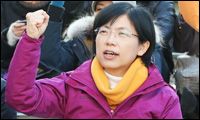Three candidates poised to highlight policy differences
During the televised presidential debates, the three participants are poised to clearly state their differences in policy.
Many voters say that pledges made so far by the two main contenders, Park Geun-hye and Moon Jae-in are too similar, making it difficult to decide which candidate is deserving of their support.
The first debate at the MBC studio in Yeouido, Seoul, will most likely highlight a clash between conservative Park and liberal Moon over issues of national security and how best to engage with North Korea.
Both agree that President Lee Myung-bak’s approach to the Stalinist regime should be revised. The policy, the so-called “denuclearization, openness, 3,000” states that South Korea will support the North to raise its Gross National Income (GNI) to $3,000 in 10 years from 2008 when the outgoing President took office. However, it requires Pyongyang to abandon its nuclear arms as a prerequisite.
Park of the ruling Saenuri Party and Moon of the main opposition Democratic United Party (DUP) claim the new government should take a more lenient approach.
The Saenuri Party candidate pledged to set up offices in Seoul and Pyongyang to further cooperation between the two sides. She proposed meeting North Korean leader Kim Jong-un if she takes the nation’s top job. Park also favors trilateral talks among South Korea, the United States and Japan to tackle the North’s nuclear arms issue.
Moon criticizes President Lee’s “denuclearization, openness, 3,000” but offers a different set of solutions.
He seeks to establish a five-year plan to enable an economic union between the two Koreas and has also specified that he will dispatch an envoy to attend a summit with Kim Jong-un during his first year of presidency, if he is elected.
The DUP candidate said he will also resume the six-party talks comprised of the two Koreas, the U.S, China, Japan and Russia.
Lee Jung-hee of the minor opposition United Progressive Party (UPP) shows some agreement with her two rivals because she pledges to ease tensions between the two Koreas. However, she is committed to entirely scrapping President Lee’s policy approach and is also calling for cuts in military spending.
The Dec. 10 debate, to be held at a KBS studio in Yeouido, will give the two candidates another chance to differentiate their policy pledges.
The talks will center on economic issues, including labor relations and unemployment. While both Park and Moon stress increasing the number of jobs, the latter seeks to provide these through further development of science and information technologies.
Her DUP rival, on the other hand, is pushing to set up an administrative office that would focus solely on supporting people seeking employment.
He also added that he will create 700,000 new jobs by reducing the number of working hours done by current employees.
Lee says that the Korea-U.S. Free Trade Agreement (FTA) is a threat to the economy, and she pledges to scrap it, claiming it will result in more jobs for locals.
The three contenders will make their final concerted campaign efforts on Dec. 16 when they face off for the third debate.
The encounter will focus on welfare. So far, Park and Moon have both called for free day-care programs for those aged five or under, cuts in college tuition by 50 percent, and free high school-level education.
However, Moon has suggested more extensive health insurance subsidizes than Park because he has pledged to restrict the maximum amount a patient will have to pay to no more than 1 million won ($920), irrespective of the costs patients incur while receiving treatment.
Currently Park only suggests that the government will cover full costs for people receiving treatment for cancer, cardiovascular disorders, cerebrovascular disorders, and intractable diseases.
The UPP candidate has much in common with Moon regarding health policies, recommending that hospitals are prohibited from taking more than 1 million won from individual patients each year, while also advocating that free medical treatment be made available for children aged younger than seven years old. <The Korea Times/Yi Whan-woo>

























































